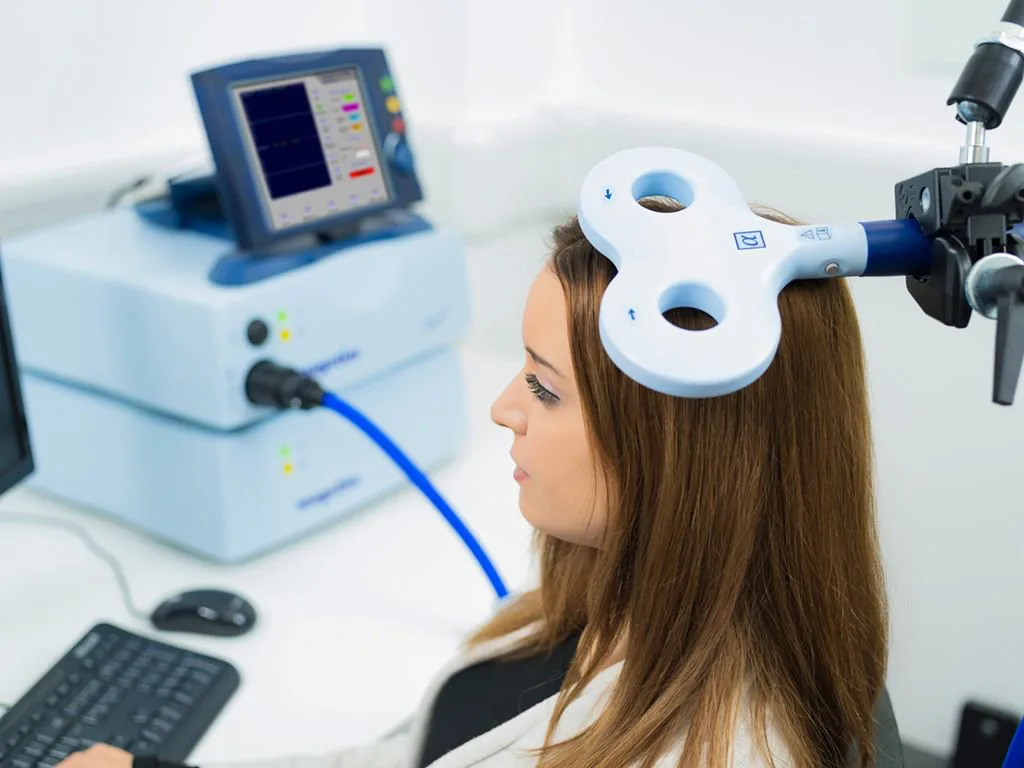Transcranial Magnetic Stimulation (TMS) is a revolutionary and non-invasive technique utilized to manage numerous mental health issues, notably anxiety disorders.
Given the escalating occurrence of anxiety disorders globally, the need for innovative treatments such as TMS is more urgent than ever.
TMS employs magnetic fields to stimulate neurons in the brain – an approach demonstrating considerable potential in diminishing anxiety symptoms and enhancing mental well-being overall.
- TMS versus Traditional Anxiety Treatments: A Comparative Analysis
- The Functioning of TMS and Its Role in Anxiety Management
- Assessing the Success of TMS Treatment for Anxiety Disorders
- What to Expect during Your First Visit to a TMS Therapy Center
- Picking the Right TMS Therapy Center: Key Factors to Consider
TMS versus Traditional Anxiety Treatments: A Comparative Analysis
To really get why TMS is causing such a buzz in the world of anxiety treatments, let’s put it side by side with traditional methods – primarily medication and therapy.
Medication

Sure, meds can be quite effective. They’ve been around for a while, and they’ve helped a lot of people.
But they can also bring a bag full of side effects along with them – some minor ones like feeling sleepy, a bit nauseous, or having a dry mouth, and some biggies like putting on weight, losing interest in sex, and sometimes, they can even hike up those anxiety symptoms.
Plus, over time, the effectiveness of these pills can taper off, meaning you may need higher doses and risk more side effects. And then, of course, there are those of us who just don’t get much help from meds, full stop.
Therapy
Cognitive Behavioral Therapy (CBT), a type of talking therapy, has shown its worth in helping folks manage anxiety.
It’s all about switching up those negative thought patterns, getting better at coping, and facing up to anxieties and fears.
But, truth be told, it can be a slow journey – you might need to have many sessions over a long stretch of time. And for some of us, trying to find the time and resources to go to therapy regularly can be tough.
TMS Therapy
Now, this is where TMS steps in with some real perks. Unlike meds, TMS therapy doesn’t bring along a laundry list of side effects – because it’s not a pill that works on your whole body, but a localized treatment that acts directly on certain parts of the brain.
It’s a great backup for those who can’t stand the side effects of anxiety meds or who’ve tried them and didn’t get the relief they were looking for.
When you put TMS side by side with therapy, it might seem like a speedier option. Each session lasts about 40 minutes, and you’d usually wrap up the whole treatment in four to six weeks.
Plus, because it’s non-invasive and doesn’t need you to be sedated, you can hop right back into your daily routine after each session.
So, while the old-school treatments still play a major role in dealing with anxiety disorders, TMS therapy is strutting onto the scene with a fresh approach that’s proving to be a game-changer for many people.
But remember, the best treatment plan is usually a mix and match – a little bit of medication, some therapy, and perhaps TMS.
It’s always best to chinwag with your healthcare provider or a mental health pro to figure out the best treatment recipe for you.
The Functioning of TMS and Its Role in Anxiety Management
The TMS therapy protocol involves situating an electromagnetic coil against the scalp of the patient.
This coil, steered by a cutting-edge machine operated by proficient professionals at a TMS treatment center, emits targeted magnetic pulses. These pulses effortlessly penetrate the skull, reaching the neural tissue beneath.
The magnetic pulses emanating from the TMS machine interact with the brain on a cellular level. They adjust the neural circuits associated with anxiety and other mental health disorders.
This adjustment can recalibrate the nerve cells in certain brain regions, leading to a decrease in the intensity of anxiety symptoms.
These sessions often need to be repeated (rTMS) over a series of weeks, necessitating regular visits to a TMS center.
The therapy doesn’t call for sedation, and the patient can resume their daily activities post each session, making it a feasible option for many.
Assessing the Success of TMS Treatment for Anxiety Disorders

Research into TMS treatment for anxiety disorders has generated encouraging results. Studies have documented a substantial decrease in anxiety symptoms in patients who underwent TMS therapy, as opposed to those who did not.
While conventional treatments like medications and psychotherapy remain crucial, TMS brings new hope, especially for patients who have found other treatment options insufficient.
Moreover, TMS is generally well-tolerated by patients with few side effects. The most common side effects reported are mild headaches or lightheadedness after the treatment.
This makes TMS a practical treatment alternative even for those who experience difficulties with the side effects of traditional treatments.
What to Expect during Your First Visit to a TMS Therapy Center
If you’re contemplating a visit to a TMS therapy center for the first time, you can anticipate:
- Initial Evaluation: An in-depth assessment where your medical history will be reviewed, and the potential benefits and risks of TMS therapy discussed. This is usually overseen by a psychiatrist or another mental health professional experienced in TMS therapy.
- TMS Sessions: TMS sessions typically last around 40 minutes and are usually scheduled five days a week for four to six weeks. The frequency and duration can be adjusted based on your unique needs and responses to the treatment.
- Post-session Routine: Following each TMS session, you can typically return to your routine activities immediately, making TMS a practical choice for those seeking an effective anxiety treatment that can be seamlessly integrated into their busy lives.
Picking the Right TMS Therapy Center: Key Factors to Consider
Selecting a reliable TMS therapy center is a critical part of your journey towards improved mental health. Here are some factors to consider when making your choice:
- Staff Expertise: Look for a center with highly skilled professionals with experience in TMS therapy.
- Track Record: Consider a center with a proven record of success in administering TMS therapy.
- Patient Reviews: These provide a realistic picture of what to expect.
- Safety Protocols: Ensure the center adheres strictly to established safety protocols for TMS therapy.
- Supportive Environment: A center that provides a comfortable and supportive environment is an excellent choice.
In conclusion, TMS therapy is a promising development in the field of mental health, particularly for individuals grappling with anxiety disorders.
When selecting a TMS center, remember to consider the factors outlined above to ensure you receive the best possible care.
The road to improved mental health can be challenging, but with the right treatment center and the right therapeutic approach, it’s definitely navigable and rewarding.

Jean Smith is a fitness enthusiast and blogger who focuses on fitness and a healthy lifestyle. She is passionate about assisting people in living healthier lifestyles and is constantly on the lookout for new and creative methods to stay fit and healthy. Her articles are excellent resources for anyone interested in improving their health and fitness.
